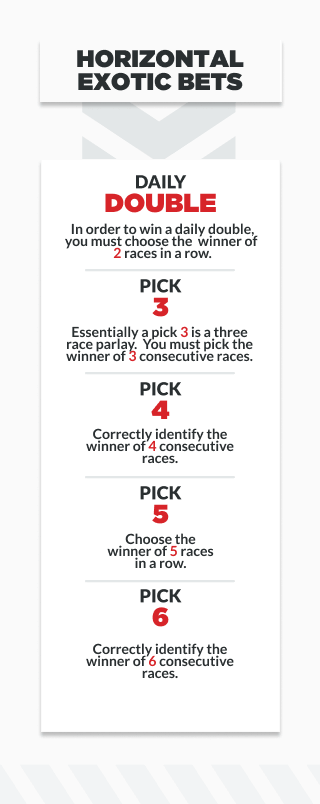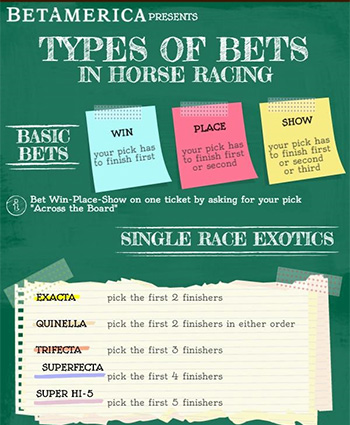Horse racing gambling terms

Punt: Another term for a bet or wager on a horse. Punter: Considered to be a Bettor or Investor. Ratings: A numerical figure given to a horse to reflect their. Horse Running Terms · All-Out · Bearing · Beyer Speed · Bobble · Blind Switch · Closer · Checked · Dead Heat. The horse with the shortest odds for a race. Field. The number horse racing gambling terms horses in a race. Filly. A female horse aged four-years-old or younger. Front. A bet consisting of 15 bets involving 4 selections in different events. The bet includes 4 singles, 6 doubles, 4 trebles, and 1 fourfold. Only.
Horse Racing Terminology
What is the best bet to place in horse racing? Horse Racing Betting Strategy #1 : Use A Key
What do you say when placing a horse racing bet? Simply say to the betting operator the number of the horse you have selected, the amount you wish to bet and the type of bet you want to place.
What is the saying beating a horse? Flogging a dead horse (or beating a dead horse in American English) is an idiom meaning that a particular effort is futile, being a waste of time without a positive outcome, e.g. such as flogging a dead horse, which will not compel it to do useful work. A man sits atop a dead horse in Sheboygan, Wisconsin.
What is bet lingo? The term bet can be used in a few different ways on social media but generally means agreed or okay. For instance, someone might say, “Want to grab lunch later?” and the other person responds, “Bet”. It can also be used as a shorthand to mean “you can count on it” or “trust me.”
How much is a $2 win place show bet? Win/Place or Place/Show: Simply a combination of win & place or place & show. There are two combinations, so a $2 bet would cost $4 in total.
How do you say bet in horse racing? Here's the usual method of stating your bet: Give the AMOUNT of the wager ($2 minimum), the TYPE of bet, and the NUMBER or numbers of your selections. For example- $3 to win on number 5; $6 to show on number 7; $4 exacta, 3-2.
Exacta! Horse Betting Terminology for Rookies
If they finish 1st or 2nd, in either order, you win. Also known as an Exacta Box. Trifecta — Pick three horses. If they finish 1st, 2nd and 3rd, in exact order, you win. Superfecta — Pick four horses. If they finish 1st, 2nd, 3rd and 4th, in exact order, you win. Daily Double — Two specific races make up the Daily Double.
Pick one horse in each race. If they finish 1st in both races, you win. You have to make your bet before the first race. Pick 6 — The biggest bet you can make. Pick the winning horse in six consecutive races. Derby: A stakes race for three-year-olds. Draw: A horse's starting position in the barrier starting stalls.
Entire: An ungelded male horse. Even Money Bet or Evens : A bet. False Favorite: A horse that is a race favorite despite its lack of credential to win the race. Horse racing gambling terms Fast track : Condition of a very dry track where fast times are recorded. Favorite: The horse that is considered to have the best chance of winning the race. Field: All the runners in a race. Filly: Female horse three-years-old or younger.
First Up: The first run a horse has in a new racing campaign or preparation. Flat race: Raced on flat track surface rather than over obstacles such as Hurdles. Form: A statistical study of a horse's previous career race performance. Front-runner: A horse with early gate speed who likes to lead in races. Gate: Another term for barrier, or position a horse will start from.
Gelding: A male horse that has been castrated. Going: The condition of the racing surface fast, good, dead, slow or heavy. Good track : Condition of racing surface.  A firm, dry surface. Hand: Four inches. A horse's height is measured in hands and inches from the top of the shoulder withers to the ground. Thoroughbreds typically range from 15 to 17 hands.
A firm, dry surface. Hand: Four inches. A horse's height is measured in hands and inches from the top of the shoulder withers to the ground. Thoroughbreds typically range from 15 to 17 hands.
Handicap: A race for which the track handicapper assigns the weights to be carried. Each horse is allocated a different weight to carry, the theory being all horses then run on a fair and equal basis. Handicapper: Club official who allocates the weights to be carried in handicap events.
Hand and Heels: The jockey urges a horse with hands and legs without using the whip. Head: A winning losing margin between horses in photo finishes. Heavy track : Track conditions that are heavily rain affected. Horse: A "Horse" is referred to an ungelded entire male four-years-old or older. Impost: The allocated weight carried by a horse.
In The Money: Finishing in the placings, first, second or third. Judge: The club official who declares the official placing's for each race. Jumper: Steeplechase or hurdle horse. Juvenile: Two-year-old horse. Length: A measurement approximating the length of a horse approx. Long Shot: A Horse that is not expected to win and starts at long odds.
Lug In Out : Action of a tiring horse, bearing in or out, failing to keep a straight course. Maiden: A horse that has not won a race. Maiden Race: A race for horses who have not won a race. Mare: Female horse four-years-old or older. Market: A list of horses in a race and their respective odds or prices.
Morning Line: Approximate odds quoted before betting begins officially for the day. Mudlark: A horse that races well on rain affected tracks especially in heavy conditions. Mug Punter: A punter that regularly loses his money when betting. Neck: Unit of measurement approximately the length of a horse's neck.
Nominations: The list of horses entered by owners and trainers for a race. Nose: Smallest margin a horse can win by. Oaks: A stakes event for three-year-old fillies, or females. Odds: Prices offered by a bookmaker or totalisator. Odds Against: Odds of even money or longer. Odds-On: Odds shorter than even money. Nfl week 1 win probability On The Nose: Betting a horse to win only. Outlay: The money a punter bets is called his or her outlay.
Out Of The Money: A horse that finishes worse than third and misses a place. Outsider: A horse that is not expected to win. Overlay: The odds on offer are better than form says they should be. Pacifier: A hooded device with meshed goggles worn by the horses to protect their eyes.
Penalty: A weight added to the handicap weight of a horse. Photo Finish: A close finish where a photo is used to determine the placegetters. Place: Finish in the top three in a race or event in fields of eight or more horses. If there are only six or seven runners the horse must finish first or second to place. Price: Odds on offer for horses in a race. Protest: When a jockey, owner, trainer or steward alleges interference by one party against another during a race that may have affected the outcome of a race.
If a protest is upheld by officials, the runner that caused the interference is placed directly after the horse interfered with. If a protest is dismissed by officials, the original result of the race stands. Punt: Another term for a bet or wager on a horse.
Punter: Considered to be a Bettor or Investor. Ratings: A numerical figure given to a horse to reflect their chance of winning a particular race after taking a number of form factors into account. Restricted Races: Races which only certain horses are eligible. Return: The dividend you receive on a particular bet.
Roughie: A horse which is considered to have a 'rough' chance of winning a race. Shadow Roll Nose Roll : Usually a lamb's wool roll half way up the horse's face to keep him from seeing his own shadow. Shorten Tighten : When the odds of a horse decrease, usually because a lot of money has been placed on that horse by punters. Short Price: Low odds where a punter will get a small return for their initial outlay.
Sire: Father of a horse. Slow track : A racing strip that is wet on both the surface and base. Between good and heavy.